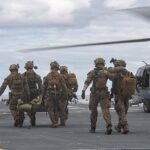It may not surprise you to learn that as with many other important issues, Donald Trump doesn’t understand how the global arms trade works.
On his recent trip to Japan, Trump crowed about the “massive” amounts of weaponry Japan was going to buy from the US, “as they should.” And of course, he bragged about all the jobs that would bring to America. Trump’s number one example was the sale of Lockheed Martin F-35 combat aircraft to Japan.
There are two problems with Trump’s boasting. First, he seemed to be implying that he had something to do with brokering the F-35 sale to Japan. He did not. That offer was made during the Obama administration back in 2012. It seems like the only thing Trump truly likes about the Obama legacy is our ex-president’s ample arms sales offers – so much so that he routinely tries to take credit for them.
Second, and even worse, Trump has no idea of how few jobs the F-35 deal with Japan will actually create. As my colleagues at the Security Assistance Monitor have documented, the State Department has licensed a deal under which Japan will spend over $5 billion in exchange for the construction of an F-35 final assembly facility there. So, the Japanese purchase of F-35s will indeed create jobs – in Japan. You would think that someone like President Trump, who prides himself on being a master deal maker, might have figured that out before bragging about all the jobs the deal would bring home to America. Yes, we will be exporting F-35s to Japan. But we will also be exporting most of the jobs involved in building those aircraft.
Trump’s huckstering in Japan echoed his performance in Saudi Arabia back in May, on his first overseas trip as president. With great fanfare, Trump announced that the United States would be selling $110 billion worth of weaponry to Riyadh – almost as much as the record levels offered during the eight years of the Obama administration. But upon closer scrutiny, tens of billions worth of sales that Trump was claiming credit for had been put together under – you guessed it! – the Obama administration. Other aspects of the deal involved vague promises of sales that may never come to fruition. But no matter. Trump threw up a nice fat number and bragged that it would bring “jobs, jobs, jobs” to America.
The point that Trump seems to be missing is that most foreign arms sales these days involve “offsets” – investments in the recipient nation that, as the term suggests, help offset the huge costs of importing a modern weapons system. Under his Plan 2030, Saudi Crown Prince Mohammed Bin Salman (or MBS, as he is known more colloquially) has decreed that Saudi Arabia’s goal is to produce 50% of the value of any arms it imports in Saudi Arabia, up from 2% currently. US firms like Lockheed Martin and Raytheon have duly sworn allegiance to this goal, and a recent batch of Lockheed Martin/Sikorsky helicopters will be assembled in Saudi Arabia.
Next time Donald Trump talks about all the jobs he can generate through foreign arms deals, take a closer look. Chances are there will be far less there than meets the eye.
William D. Hartung is the director of the Arms and Security Project at the Center for International Policy and a senior adviser to the center’s Security Assistance Monitor.














